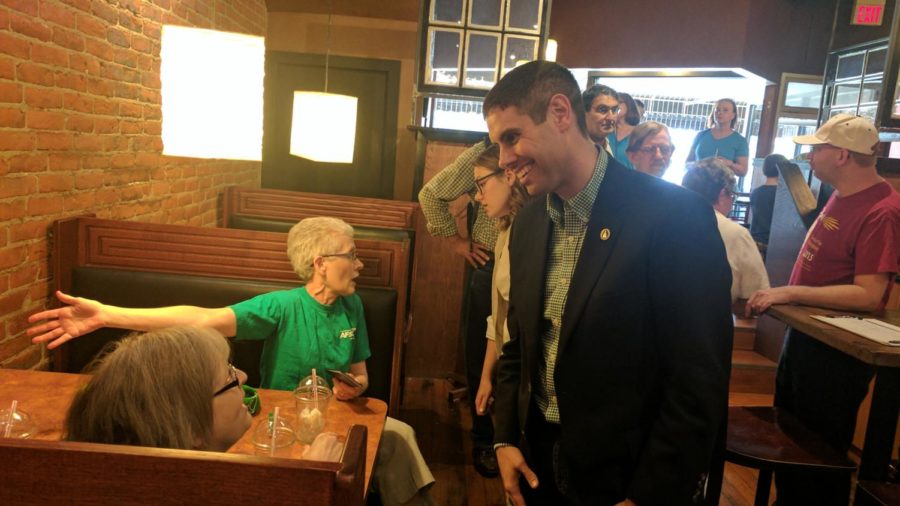- App Content
- App Content / News
- News
- News / Election
- News / Politics And Administration
- News / Politics And Administration / State
- News / State
Boulton’s labor background drives his gubernatorial campaign
Nate Boulton held a meet and greet with Ames voters at Cafe Diem. He told voters they were in a fight for the soul of our state.
February 14, 2018
Nate Boulton, Democratic candidate for governor, feels we are in a fight for the soul of our state and that the future of Iowa is on the ballot in 2018.
Boulton, a lifelong Iowan, speaks about his rural upbringing and the influence it has on his politics.
“I’m someone who grew up in rural Iowa in Columbus Junction that had the hope of continuing the advancement of workplace rights,” Boulton said.
Coming from a family of union members, workers rights is a central theme in Boulton’s campaign. Boulton is also proud to have fought for these causes in his law practice, where he practices in workers compensation, personal injury and labor law.
Boulton was elected to Iowa Senate District 16 in 2016 and hoped to use that position to continue advancing the rights of working Iowans.
“Unfortunately, when I got to the state senate all we really saw was an agenda that attacked the quality of life for working Iowans,” Boulton said.
What Boulton sees as particularly frustrating is the fact the Branstad-Reynolds administration campaigned on creating 200,000 jobs and increasing earnings by 25 percent in the state.
What Boulton saw instead was an agenda that took away collective bargaining rights and injury protections from working Iowans while also lowering the minimum wage in four Iowa counties.
Many of these changes came at the same year Boulton was elected to the Iowa Senate, when Republicans gained control of the governorship and both houses of the Iowa Legislature.
Boulton is not just dissatisfied with the current administration on the grounds of workers’ rights. He would also like to see education take a higher priority in the state.
Boulton, who originally went to school to become a high school teacher, is concerned with the amount of underfunding in Iowa’s schools, from kindergarten to the university level.
“It’s frustrating to see a state who’s always prided itself in having an education that’s world class, going through seven, soon to be eight, consecutive years of underfunding K-12 education,” Boulton said.
To Boulton, the issues in Iowa’s education are easily apparent. He claimed a 22-year-old graduate with a teaching certificate is going into a job where they cannot negotiate benefits, are in danger of losing retirement security and have less resources going into their classroom in the state of Iowa.
Another issue to a hypothetical college graduate in the state is rising college tuition and educational debt. Boulton spoke out against funding cuts that would lead to a 40 percent increase in tuition at Iowa’s public schools in the next five years.
“If we continue to see that lack of support for our education system we not only see a decrease in the quality of education these universities can provide, but it puts a tax on students,” Boulton said.
Boulton would like to see measures taken which would reduce student debt and help students graduate debt free. Boulton would like to see this done through scholarship and debt forgiveness programs rather than a universal higher education system.
Cathy Glasson, another Democratic candidate for governor, has positioned herself on the political left of the Democratic Party by also aligning herself as a labor leader and advocating for universal health care in the state of Iowa. Boulton agrees that healthcare costs are an issue in Iowa, but doesn’t necessarily advocate for a universal healthcare system.
“Right now, we need to talk about expanded access to quality healthcare for Iowans,” Boulton said.
His main focus as governor would be to reverse what he sees as a failing privatized Medicaid system and greater protection for planned parenthood in the state.
Boulton is not necessarily against universal healthcare, rather he would like to see it be implemented at the national level.
“I think Iowa needs a strong federal partner to pursue something like that,” Boulton said.
When asked what separates himself from other Democratic candidates running for governor, Boulton spoke about his experience in his law practice and in the Iowa Senate. He feels his experience is “critical” and his relationships and knowledge of the legislative process will help him in actually getting an agenda passed.
Another thing Boulton feels makes him a strong candidate is the 30 labor organizations that represent around 100,000 Iowans that have thrown their support behind him.
Boulton personally has seen enthusiasm behind himself as a candidate and in the issues in his campaign.
“I think we as a campaign have focused on issues that are important to Iowans who have felt left behind, that’s something I think our campaign is going to continue to do and be successful in this election,” Boulton said.
















